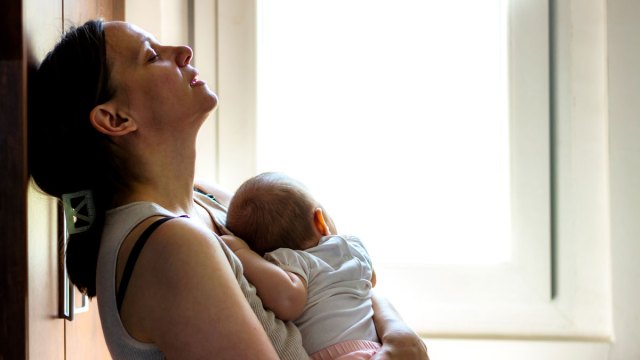The other day I was sitting in my running car, scrolling mindlessly through Twitter, when I noticed something in the car next to me: A woman was waiting with her baby. This was interesting to me because I, too, was with my 22-month-old. The difference was mine was passed out in his car seat, the only place he will nap beside a moving stroller, and hers was happily playing with a toy and gazing out the window.
I watched the lady and her baby, who was probably about 10 months old, as they waited for someone. The woman was chatting on the phone, half paying attention to the baby, handing him things and steadying him while he stood in her lap. I kept watching. Surely the baby would start to cry. Soon he would demand to be let out of the car. Soon he would pull his mother’s hair and scream until she opened the door and walked him around outside, let him touch the grass, the bricks on the sidewalk, and jiggled him up and down.
That’s what my baby would have done at that age. No way we could have just sat in the car. No way I could be on the phone without him ripping it from my ear. But no. The two of them sat there for about 40 minutes while my toddler snored away in the backseat. I was shocked. What a well-behaved baby, I thought. Then it dawned on me: Maybe it wasn’t just that this baby was well-behaved; maybe my baby was actually pretty difficult.
If you’re wondering why I’m sitting in a parked car for over 45 mins it’s because my DIFFICULT TODDLER will only nap in a running vehicle.
— Lucy Huber (@clhubes) April 4, 2022
I had a baby in Covid, and before that, I didn’t really know any babies. Or at least I wasn’t well-acquainted with them—more of a casual observer. I spent almost the first full year of his life with just my husband and him, isolated from the world. No mommy-and-me classes, no chatting with other moms in the park, no baby swim classes, no anything. With nothing to compare him to, I had no idea if he was a difficult baby or not. All I knew was this was hard.
But looking at her, it didn’t look hard. She was able to do stuff when her baby was around? I hadn’t done stuff in two years. Naptime, what was supposed to be my only reprieve, was spent either walking the stroller or sitting in the car. Nighttime was a mess: He woke up several times every night and yelled endlessly in his crib. If I tried to put him down to make dinner or empty the dishwasher, he’d scream bloody murder. How many times had I found myself sitting on the floor, holding the baby instead of folding laundry or doing work, crying a little, thinking I must be the absolute worst at being a mother because I couldn’t seem to get anything done?
Of course, I had no idea what this woman’s baby was like at 2 a.m. Maybe he was difficult then, too. But at this moment, watching him happily entertain himself in the car the way my baby never would, it felt like such a simple revelation: I wasn’t doing a terrible job; some babies are just harder than others.
Anyway, this is what I’m doing while he naps and we watch the well-behaved baby. pic.twitter.com/E8c2MVYAZx
— Lucy Huber (@clhubes) April 4, 2022
Because I wasn’t around any other parents for his first year, I based most of my knowledge of what other babies were like on what I saw other mothers post in parenting Facebook groups. They all seemed so knowledgeable. They had it all together. They had their babies sleep-trained and wake-windowed and baby-led weaned all while making homemade baby food and using cloth diapers. I could never keep up. (Or maybe the moms on the internet were lying so nobody knew that they, too, were sitting on their dirty living room floor, crying and rocking a baby instead of folding laundry.)
The pandemic made things hard for parents in a lot of ways, and one huge thing it took from new parents was the ability to connect with one another in person. If I had been able to see other parents, really see them, not just their highlights on social media, I think it would have been easier for me. I would have seen that some babies go to sleep much easier than mine. Some babies actually let their parents put sunscreen on their face without a 15-minute meltdown, unlike mine. And also, I would have seen things my baby was good at that perhaps theirs were not, like eating a variety of foods and being a social butterfly.
Now that the world is opening up, I can finally see what I was missing in the first year of his life: Babies are wildly unpredictable. We are all struggling as parents in different ways, and most of it (probably) isn’t our fault.
RELATED LINKS
I Am a Pandemic Mother
Study Shows: When Your Baby Cries, You Literally Can’t Concentrate on Anything Else
Why You Should Fight the Urge to Make a Happy Kid Happier











